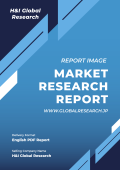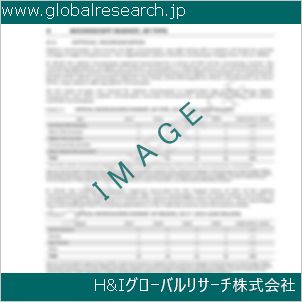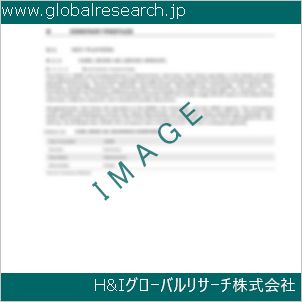| ◆英語タイトル:Cataract Surgery Devices Market - Growth, Trends, Covid-19 Impact, and Forecasts (2023 - 2028)
|
 | ◆商品コード:MOR23MAR0003
◆発行会社(リサーチ会社):Mordor Intelligence
◆発行日:2023年1月23日
最新版(2025年又は2026年)についてはお問い合わせください。
◆ページ数:120
◆レポート形式:英語 / PDF
◆納品方法:Eメール(受注後2-3営業日)
◆調査対象地域:アメリカ、カナダ、メキシコ、ドイツ、イギリス、フランス、イタリア、スペイン、中国、日本、インド、オーストラリア、韓国、中東、南アフリカ、ブラジル、アルゼンチン
◆産業分野:医療
|
◆販売価格オプション
(消費税別)
※
販売価格オプションの説明はこちらで、
ご利用ガイドはこちらでご確認いただけます。
※お支払金額は「換算金額(日本円)+消費税+配送料(Eメール納品は無料)」です。
※Eメールによる納品の場合、通常ご注文当日~2日以内に納品致します。
※レポート納品後、納品日+5日以内に請求書を発行・送付致します。(請求書発行日より2ヶ月以内の銀行振込条件、カード払いに変更可)
※上記の日本語題名はH&Iグローバルリサーチが翻訳したものです。英語版原本には日本語表記はありません。
※為替レートは適宜修正・更新しております。リアルタイム更新ではありません。
Mordor Intelligence社の本市場調査レポートでは、世界の白内障手術用デバイス市場規模が、予測期間中(2022年〜2027年)に年平均4.2%で成長すると展望しています。本レポートは、白内障手術用デバイスの世界市場にについて広く調査し、イントロダクション、調査手法、エグゼクティブサマリー、市場動向、製品種類別(眼内レンズ、乳化剤注入装置、眼科用粘弾性デバイス、その他)分析、エンドユーザー別(眼科クリニック、病院、その他)分析、地域別(アメリカ、カナダ、メキシコ、ドイツ、イギリス、フランス、イタリア、スペイン、中国、日本、インド、オーストラリア、韓国、中東、南アフリカ、ブラジル、アルゼンチン)分析、競争状況、市場機会・将来の動向などの項目を整理しています。なお、主要参入企業として、Alcon, Inc.、Johnson & Johnson、Nidek Co., Ltd.、HAAG-Streit Holding AG、Ziemer Ophthalmic Systems、Carl Zeiss Meditech AG、Bausch & Lomb, Inc.、Iridex Corporation (Topcorn Corporation)、STAAR Surgical Company、Coburn Technologies Inc.、HumanOptics AGなどの情報を含んでいます。
・イントロダクション
・調査手法
・エグゼクティブサマリー
・市場動向
・世界の白内障手術用デバイス市場規模:製品種類別
- 眼内レンズの市場規模
- 乳化剤注入装置の市場規模
- 眼科用粘弾性デバイスの市場規模
- その他製品の市場規模
・世界の白内障手術用デバイス市場規模:エンドユーザー別
- 眼科クリニックにおける市場規模
- 病院における市場規模
- その他エンドユーザーにおける市場規模
・世界の白内障手術用デバイス市場規模:地域別
- 北米の白内障手術用デバイス市場規模
アメリカの白内障手術用デバイス市場規模
カナダの白内障手術用デバイス市場規模
メキシコの白内障手術用デバイス市場規模
…
- ヨーロッパの白内障手術用デバイス市場規模
ドイツの白内障手術用デバイス市場規模
イギリスの白内障手術用デバイス市場規模
フランスの白内障手術用デバイス市場規模
…
- アジア太平洋の白内障手術用デバイス市場規模
中国の白内障手術用デバイス市場規模
日本の白内障手術用デバイス市場規模
インドの白内障手術用デバイス市場規模
…
- 中東/南米の白内障手術用デバイス市場規模
南アフリカの白内障手術用デバイス市場規模
ブラジルの白内障手術用デバイス市場規模
アルゼンチンの白内障手術用デバイス市場規模
…
- その他地域の白内障手術用デバイス市場規模
・競争状況
・市場機会・将来の動向 |
The cataract surgery devices market is expected to register a CAGR of 4.2% during the forecast period of 2022-2027.
The COVID-19 pandemic led to disruption in not only the research and development activities of other therapies and drugs for medical conditions other than COVID-19 but also impacted the treatment procedures and supply chain of the pharmaceuticals and medical devices around the world, which also impacted the cataract surgery devices market. For instance, according to a research study published in December 2021, titled “Impact of COVID-19 Pandemic on Cataract Surgical Volume: A North Indian Experience”, the studied clinic was expected to perform 7,500 cataract procedures, but due to the pandemic, they were able to perform only 2,500 procedures. This data suggests that there was a significant decrease in cataract procedures during the COVID-19 pandemic. However, with the ongoing vaccination programs and decreasing COVID-19 cases, the studied market is expected to regain its full potential over the forecast period of the study.
The major factors that are expected to drive growth in the cataract surgery devices market are the increasing prevalence of the cataract and the growing geriatric population globally. For instance, according to the research study published by Xiaotong Han et al., in September 2021, the global prevalence rate of cataract-related visual impairment increased by 58.45%, from 791.4 per 100,000 people in 1990 to 1,253.9 per 100,000 people in 2019, and the cataract-related disability-adjusted life years (DALYs) rate increased by 32.18 percent from 65.3 per 100,000 people in 1990 to 86.3 per 100,000 people in 2019, which shows an increase in cataract and cataract related illness, globally and thus, the demand for cataract surgery devices for treatment is increasing which is fueling growth in the studied market.
Further, according to the research study published by Konrad Pesudovs et. a., in June 2021, 2020, an estimated 15.2 million people aged 50 and more were blind, with another 78.8 million suffering from moderate to severe vision impairment (MSVI) due to cataract, and since 2000, there has been a 29.7% increase in the incidence of cataract blindness and a 93.1 percent increase in cases of MSVI. Hence, the number of surgeries for the treatment of cataracts is expected to increase over the years, which will drive growth in the cataract surgery devices market over the forecast period.
Moreover, the prevalence of cataracts is found to be higher in the older population, and with the growing geriatric population, the burden of cataracts is further expected to increase, which will have a positive impact on the growth of the cataract surgery devices market. For instance, according to the October 2021 update of the World Health Organization, the percentage of people of age more than 60 years in the global population will increase from 12% in 2015 to 22% by 2050, of which about 80% of the older people in 2050 will be living in the low-and middle-income countries. Also, as per the same source, the common heath conditions associated with aging includes hearing loss, cataracts and refractive errors, back and neck pain, and other. Also, technological advancements in ophthalmic devices are further expected to augment growth in the studied market over the forecast period of the study. However, the high cost associated with cataract devices and surgeries is expected to restrain growth in the cataract surgery devices market during the forecast period of the study.
Cataract Surgery Devices Market Trends
Phacoemulsification Equipment Segment is Expected to Hold a Significant Share in the Cataract Surgery Devices Market Over the Forecast Period
Phacoemulsification systems are one of the most advanced types of equipment used in treating cataracts, and by using phacoemulsification equipment, the lens is emulsified with ultrasound before being suctioned out. With the help of phacoemulsification equipment, cataract surgery is performed through a 2.5 to 2.8 mm incision with the help of a titanium needle vibrating at the rate of more than 40,000 times per second.
The phacoemulsification systems offer several advantages over other cataract surgery procedures due to which this equipment is widely used in ophthalmology settings around the world, and with the increasing burden of cataracts, their usage is further expected to increase, which will boost growth in the segment. Some of the major benefits offered by phacoemulsification equipment in cataract surgery are no hospitalization required for surgery, small incision and lesser induced astigmatism because of the smaller incision, fast recovery from the surgery, and no restriction in daily routine. Hence, owing to these benefits, payers, and providers prefer a phacoemulsification system in cataract surgery.
In addition, the advancement in the phacoemulsification system by the key companies in the area along with the launch of new devices, collaboration, and partnerships with other companies for the development and marketing of the products, and other business expansion initiatives are expected to boost growth in the studied segment. For instance, in July 2021, Johnson & Johnson Vision, a part of the Johnson & Johnson Medical Devices Companies launched VERITAS Vision System, next-generation phacoemulsification (phaco) system designed to address three critical areas: patient safety, surgeon efficiency, and comfort. Therefore, due to these above-mentioned factors, the phacoemulsification equipment segment is expected to have a major share in the cataract surgery devices market during the forecast period of the study.
North America region is Expected to Occupy a Significant Share in the Cataract Surgery Devices Market Over the Forecast Period
By geography, the North American region is expected to hold a significant share in the cataract surgery devices market owing to the high burden of cataracts in the region, presence of advanced and robust healthcare infrastructure, growing aging population, and other factors. For instance, according to a research study in January 2022, titled “Incidence of visual impairment in Canada: the Canadian Longitudinal Study on Aging”, the incidence of cataracts in Canada was 10.38%, with British Colombia being the region with the highest prevalence of 11.26% and the burden of cataract in Canada is further expected to increase with the growing geriatric population in the country, and hence with the growing geriatric population in the region, the burden of cataract is further expected to increase, leading to increase in several cataract surgeries and thus, driving growth in the cataract surgery devices market.
In the North American region, the United States is expected to hold a major share in the cataract surgery devices market owing to a large number of cataract surgeries performed in the country due to its robust healthcare infrastructure, better reimbursement policies, and significant burden of cataract along with growing geriatric population. For instance, according to the June 2020 update of the Centers for Disease Control and Prevention (CDC), approximately 20.5 million (about 17.2% of the total population) of age 40 years and more had cataracts in one or both eyes, and it was estimated that by the end of 2020, the total number of people who have cataracts is estimated to increase to 30.1 million, which is expected to have a significant impact on the number of cataract surgeries performed in the country and boost growth in the studied market. Further, with the growing aging population of the country, the cataract surgery devices market in the United States is expected to grow over the forecast period. Therefore, due to the above-mentioned factors, in the North American region, the United States is expected to have a significant market share in the cataract surgery devices market during the forecast period of the study.
Cataract Surgery Devices Market Competitor Analysis
The cataract surgery devices market is moderately competitive, with several major players in the area. Also, the new technological advancements and launch of new products and initiatives are expected to make the market more competitive. Some of the key companies leading the market are Coburn Technologies Inc., Alcon Surgical Resources, Johnson & Johnson, NIDEK, Abbott, Ziemer Ophthalmic Systems, Carl Zeiss Meditech AG, and Alcon, Inc., among others.
Additional Benefits:
- The market estimate (ME) sheet in Excel format
- 3 months of analyst support
1 INTRODUCTION
1.1 Study Assumptions and Market Definition
1.2 Scope of the Study
2 RESEARCH METHODOLOGY
3 EXECUTIVE SUMMARY
4 MARKET DYNAMICS
4.1 Market Overview
4.2 Market Drivers
4.2.1 Increase in Prevalence of Cataract Diseases and Increasing Geriatric Population
4.2.2 Technological Advancements in Ophthalmic Devices
4.3 Market Restraints
4.3.1 High Cost Incurred for Cataract Surgeries
4.4 Porter’s Five Forces Analysis
4.4.1 Threat of New Entrants
4.4.2 Bargaining Power of Buyers/Consumers
4.4.3 Bargaining Power of Suppliers
4.4.4 Threat of Substitute Products
4.4.5 Intensity of Competitive Rivalry
5 MARKET SEGMENTATION (Market Size by Value – in USD Million)
5.1 By Product Type
5.1.1 Intraocular Lenses
5.1.2 Phacoemulsification Equipment
5.1.3 Ophthalmic Viscoelastic Devices
5.1.4 Others
5.2 By End-User
5.2.1 Ophthalmology Clinics
5.2.2 Hospitals
5.2.3 Others
5.3 Geography
5.3.1 North America
5.3.1.1 United States
5.3.1.2 Canada
5.3.1.3 Mexico
5.3.2 Europe
5.3.2.1 Germany
5.3.2.2 United Kingdom
5.3.2.3 France
5.3.2.4 Italy
5.3.2.5 Spain
5.3.2.6 Rest of Europe
5.3.3 Asia-Pacific
5.3.3.1 China
5.3.3.2 Japan
5.3.3.3 India
5.3.3.4 Australia
5.3.3.5 South Korea
5.3.3.6 Rest of Asia-Pacific
5.3.4 Middle East
5.3.4.1 GCC
5.3.4.2 South Africa
5.3.4.3 Rest of Middle East
5.3.5 South America
5.3.5.1 Brazil
5.3.5.2 Argentina
5.3.5.3 Rest of South America
6 COMPETITIVE LANDSCAPE
6.1 Company Profiles
6.1.1 Alcon, Inc.
6.1.2 Johnson & Johnson
6.1.3 Nidek Co., Ltd.
6.1.4 HAAG-Streit Holding AG
6.1.5 Ziemer Ophthalmic Systems
6.1.6 Carl Zeiss Meditech AG
6.1.7 Bausch & Lomb, Inc.
6.1.8 Iridex Corporation (Topcorn Corporation)
6.1.9 STAAR Surgical Company
6.1.10 Coburn Technologies Inc.
6.1.11 HumanOptics AG
6.1.12 Glaukos Corporation
6.1.13 Sonomed Escalon
7 MARKET OPPORTUNITIES AND FUTURE TRENDS
❖ 免責事項 ❖http://www.globalresearch.jp/disclaimer












